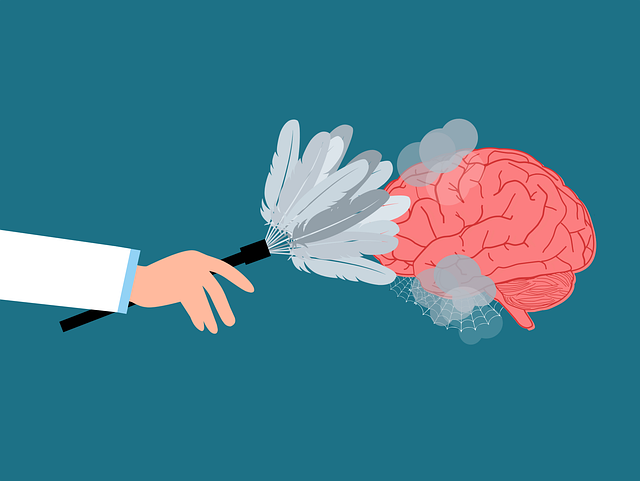Lakewood Suicide Prevention Therapy offers a holistic approach to emotion regulation through individual and group interventions, prioritizing emotional intelligence development and evidence-based techniques like mindfulness and cognitive restructuring. Their stress management workshops empower individuals to manage intense emotions and adopt healthier coping strategies. Incorporating these practices, such as CBT and mindfulness meditation, improves mental health management, reduces anxiety, and promotes cultural sensitivity in healthcare. This method enhances resilience, aligns with stigma reduction efforts, and contributes to improved overall mental health outcomes.
Emotion regulation is a vital skill for navigating life’s challenges. This article explores effective techniques, drawing from the Lakewood Suicide Prevention Therapy approach, offering practical strategies for everyday application. We delve into understanding emotional responses and provide actionable steps to foster healthy management. Additionally, we discuss incorporating these methods in therapy sessions to enhance well-being. By learning to regulate emotions, individuals can improve mental resilience and overall life satisfaction.
- Understanding Emotion Regulation: The Lakewood Approach
- Practical Techniques for Everyday Life
- Incorporating Regulation Strategies in Therapy Sessions
Understanding Emotion Regulation: The Lakewood Approach

Understanding Emotion Regulation: The Lakewood Approach
Emotion regulation is a crucial aspect of mental well-being, enabling individuals to manage and control their emotional responses effectively. It involves recognizing, understanding, and modifying feelings to achieve a state of balance and resilience. The Lakewood Suicide Prevention Therapy takes a holistic approach to emotion regulation, focusing on both individual and group interventions. This method emphasizes the development of emotional intelligence as a key strategy for stress management. By teaching individuals to identify and interpret their emotions, the therapy empowers them to make sense of their experiences and reduce impulsive reactions.
The Lakewood Approach integrates various evidence-based techniques, such as mindfulness practices, cognitive restructuring, and social support networks, into its programs. These tools help in regulating intense emotions, like anxiety relief, and fostering healthier coping mechanisms. Stress management workshops organized by the organization play a pivotal role in promoting emotional well-being within communities. Through interactive sessions, participants learn practical strategies to navigate life’s challenges, enhance their emotional intelligence, and ultimately, contribute to a more balanced and fulfilling life.
Practical Techniques for Everyday Life

Incorporating emotion regulation techniques into everyday life can be a game-changer for individuals seeking to manage their mental health. These strategies, often taught through Lakewood Suicide Prevention Therapy and similar programs, offer practical tools to navigate emotional challenges. One effective method is mindfulness meditation, which encourages individuals to focus on the present moment, thereby reducing anxiety and stress. This technique, backed by extensive research, has proven beneficial for people from diverse cultural backgrounds, highlighting the importance of Cultural Sensitivity in Mental Healthcare Practice.
Additionally, cognitive-behavioral therapy (CBT) provides a structured framework for identifying and challenging negative thought patterns. By learning to replace unhelpful thoughts with more realistic and positive ones, individuals can better regulate their emotions. Healthcare Provider Cultural Competency Training plays a vital role here, ensuring professionals understand the unique needs of diverse patient populations. Burnout Prevention Strategies for Healthcare Providers are also crucial, as they promote self-care practices that enable mental health workers to effectively support others while maintaining their own well-being.
Incorporating Regulation Strategies in Therapy Sessions

Incorporating effective emotion regulation strategies into therapy sessions is a vital component of Lakewood Suicide Prevention Therapy. By teaching clients practical tools to manage their emotions, therapists empower them to navigate life’s challenges with greater resilience and well-being. Techniques such as mindfulness exercises, cognitive restructuring, and emotional awareness training help individuals understand and process their feelings in healthier ways, thereby reducing the risk of adverse mental health outcomes.
During therapy sessions, facilitators can model these strategies, providing clear explanations and demonstrating their practical applications. Additionally, encouraging clients to share their experiences and insights fosters a collaborative environment that strengthens learning. This approach not only complements traditional therapeutic methods but also aligns with broader Mental Illness Stigma Reduction Efforts by promoting self-care and confidence boosting. Furthermore, integrating emotion regulation into therapy can enhance Self-Care Routine Development for Better Mental Health, ultimately contributing to improved overall mental health outcomes.
Emotion regulation techniques, as outlined in the Lakewood approach and demonstrated in both everyday life applications and therapy sessions, offer a powerful tool for enhancing mental well-being. By learning practical strategies from this evidence-based method, individuals can better navigate their emotional landscapes, fostering resilience and improving overall quality of life. Incorporating these techniques into therapeutic practices, especially within the context of Lakewood Suicide Prevention Therapy, can significantly contribute to preventing and managing crises, ultimately promoting healthier communities.











